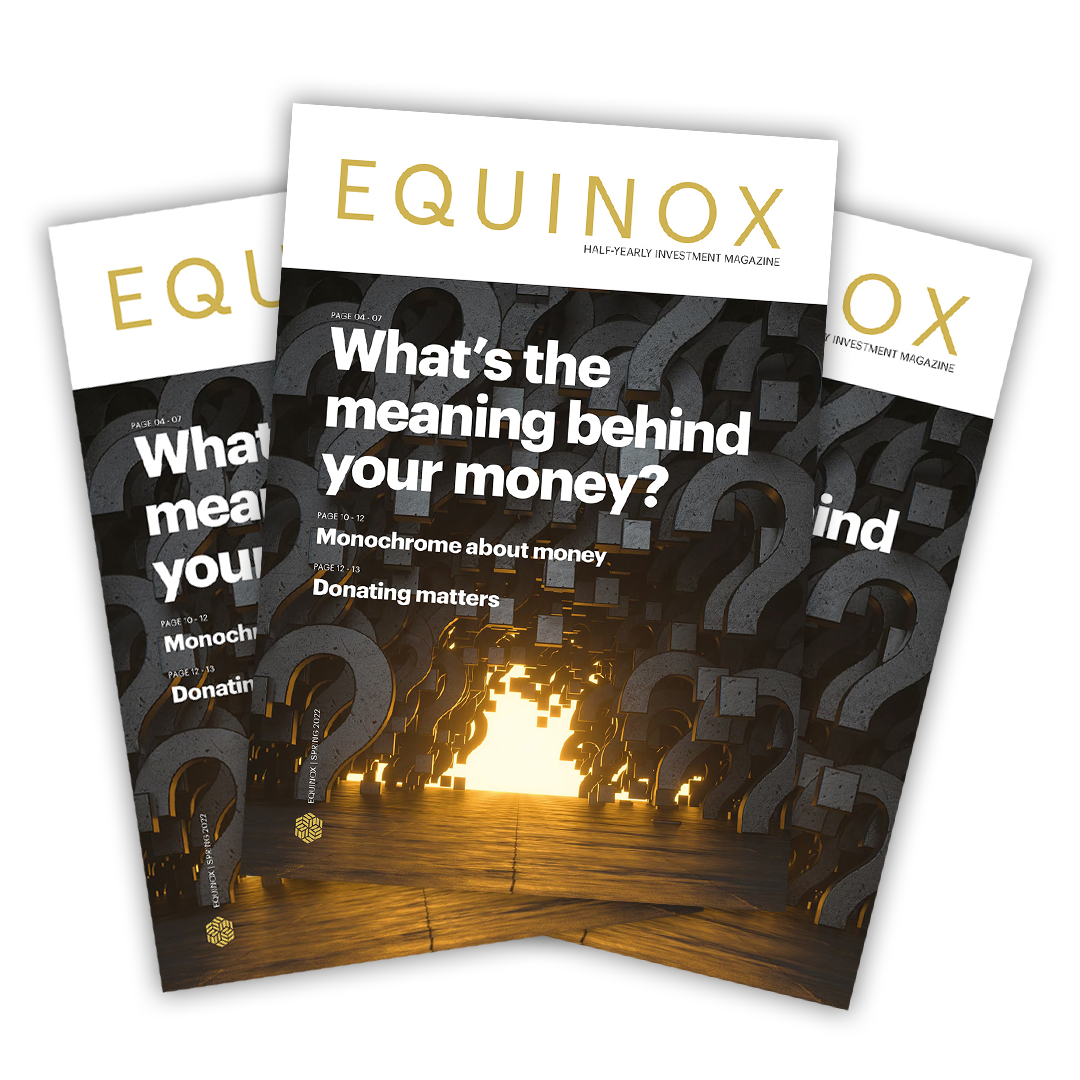This article is taken from our Spring 2022 edition of Equinox. Click here to view the full magazine.
Like many 16-year-olds, I was once faced with (what certainly felt like at the time) a very big decision; what should I study at university? And I recall thinking about the subjects that most interested me back then; psychology and philosophy.
I also remember sitting with my dad at the kitchen table where he asked me two great questions. First: “What do you want to get out of uni?” To which I responded rather flippantly: “A good time and a well-paid job”.
Brushing this off, he then asked me: “What jobs would you get from a degree in psychology?” (He knew very well I was unlikely to be suited to a life in academia or clinical research). He then left me to consider my options.
In the end, I studied economics. Now a decade after graduating, and what has sometimes felt like a never-ending stream of professional exams, I find myself working as a Financial Planner. A role in which I try to better understand how people’s money can be used to make their lives better. It is an endeavour that involves me approaching my (fundamentally economic) subject matter from a psychological, and sometimes downright philosophical, perspective.
Serendipity is a funny thing.
So, why am I telling you this? Well, consider it fair warning. This article appeals more to my inner Pavlov and Plato than Smith and Keynes. Nonetheless, I do believe that, contrary to classical economics, we are not rational decision makers, void of emotion, focused solely on the optimal level of utility. Working with clients over the years, the most economic decision doesn’t necessarily make it the right decision.
Start with ‘why’
The same year I started university, author and leadership guru Simon Sinek published a book called ‘Start With Why’ and his TED Talk on the topic later became the third most watched video ever (‘How Great Leaders Inspire Action’).
Sinek argues that ‘why’ isn’t just a word but a powerful concept for organisations.
He states that every single company on the planet knows ‘what’ they do i.e. the products or services they sell.
He then supposes that some companies know ‘how’ they do what they do. Whether it’s their unique selling point or ‘differentiating value proposition’, some companies identify what makes them better or different to their competitors.
Sinek finally argues that very few companies can clearly articulate ‘why’ they do what they do. And it’s not about running a profitable company – that’s a result. ‘Why’ is all about purpose. ‘Why’ does a company exist and ‘why’ should anyone care?
By first understanding their ‘why’, and by keeping it at the heart of everything they do, Sinek argues that companies will then strive to do more, be better and thrive.
What’s our ‘why’?
At Equilibrium, ‘what’ we do is relatively straightforward. We provide financial planning, manage risk and investments and offer tax planning advice to ensure you keep the returns you make. But the honest truth is that our ‘what’ is nothing new or different.
If you visit the website of any wealth manager or financial planner, you’ll find something very similar. Managing a client’s risk and investments in line with their objectives and minimising their exposure to tax is what you hire a financial adviser to do! They are hygiene factors. They are the tools of the trade.
Now of course, the quality of that financial planning, the technical ability to mitigate tax and manage risk is important but does that make Equilibrium different? What makes Equilibrium special? What allows our clients to trust us with their hard-earned money? What keeps them with us year after year? What makes us the No.1 financial services firm to work for in the UK?
For me, it’s our ‘why’. We believe our ‘why’ is simple; to ‘make people’s lives better’. This applies to our team, our clients, our community and anyone we interact with. It’s our shared purpose that we all work towards every day. It’s what gets us out of bed in the morning and what drives us to constantly ask ourselves: “How can we make our clients’ lives better?”
And it’s our ‘why’ that forces us to look far beyond just maximising your returns or minimising your tax liabilities. Because, whilst they help, they don’t actually make people’s lives better.
By providing clients with confidence and clarity around their wealth; which leads to them making better financial decisions or just doing something differently; this can truly make our clients’ and their family’s lives better.
In order to do this though, we need to understand the ‘why’ behind your money. What is it that you really want it to achieve for you?
I fundamentally believe that there is no such thing as a financial plan. There are life plans that need money to achieve them.
Live. Love. Legacy.
So ‘how’ do you go about finding the ‘why’ behind your wealth? Well, a good place to start is by asking ‘how’ your wealth can allow you:
- To live the life you want
- To look after those you love
- To leave a powerful legacy
By considering these three topics, you can find what is truly important to you and, in doing so, open up a vast array of opportunities to make your life, the lives of your family and the lives of those around you, better.
Live the life you want
When creating a financial plan, the first, second and third priority is you. We want to ensure that no matter what happens out in the wider world, the investment climate or even your own lives, that you have the confidence to live the life you want to live.
And the life you want to live will no doubt be completely different to mine or anyone else’s. We all have our own dreams, goals and aspirations.
You may have dreamed of travelling to the furthest corners of the world. Perhaps you’re perfectly comfortable curling up with a book in a cosy cottage in Cornwall. You may savour the gastronomic delights of Michelin starred restaurants, or maybe a roast dinner with family at your local gastropub is all you desire. Whatever it is, there is no right or wrong answer.
One of the biggest challenges I see clients face is the prospect of retirement. Again, there is no right or wrong answer. There is no one correct retirement age. For every client I have spoken to who can’t wait to finish working, there is another who gets great fulfilment and purpose from their work.
The key for me is choice. If we accept that there is no right or wrong answer, then the purpose of your money should be to provide you with choices. The choices to allow you to live the life that you want to live – whatever that life looks like.
Look after those you love
We do not exist in a vacuum and once we have considered what we want from our own lives, we tend to turn to those who are significant to us. It could be your partner, your children, your parents, your friends – anyone you care about.
And making plans or considering those we love can quite often be even more challenging than finding our own ‘why’. Not only will you have your own attitudes towards wealth and aspirations for their future, but they will have their own. And when attitudes and beliefs differ, that’s where conflict can arise.
But I do believe that all problems exist in the absence of a good conversation. Talking about money with family openly and honestly can reveal a variety of financial opportunities. I have personally seen conversations ease financial stress, provide confidence, enable career changes and even buy precious time with grandchildren.
Leave a powerful legacy
A common objective I hear from prospective clients is to minimise or save inheritance tax.
It’s understandably not the most popular tax but is that really their ‘why’ – to save tax? Or is there more to it?
I would argue that inheritance tax planning is a perfect example of a ‘how’ masquerading as a ‘why’. For most people, the ‘why’ is actually a desire for their hard-earned money to pass to their beneficiaries – family, friends or charities. Minimising inheritance tax is just ‘how’ we do that.
But stepping back and considering what happens once you’re gone is vitally important, even if it’s just to make sure the right people have all the information you would want them to have.
Thinking about legacy can also lead to hard truths about what you want to happen to your wealth. Who do you want to benefit? When would it have the biggest impact? How much is enough? Are there others you want to support?
It’s never easy to do but one of the challenges I make to clients is:
“If you are uncomfortable giving modest amounts during your lifetime, when you can guide and support your loved ones, why would you give them all of it on death when you have no influence whatsoever?”
Finding your ‘why’
I hope this has stimulated some thought for you. Taking time to pause isn’t always easy. But the best things never are and at Equilibrium we’re here to work with you and spend some more time thinking about the meaning behind your money.
Why? Because we are committed to making your life better.
This blog is intended as an informative piece and does not construe advice. If you have any further questions, please don’t hesitate to get in touch with us using the form below or by reaching out to your usual Equilibrium contact.


